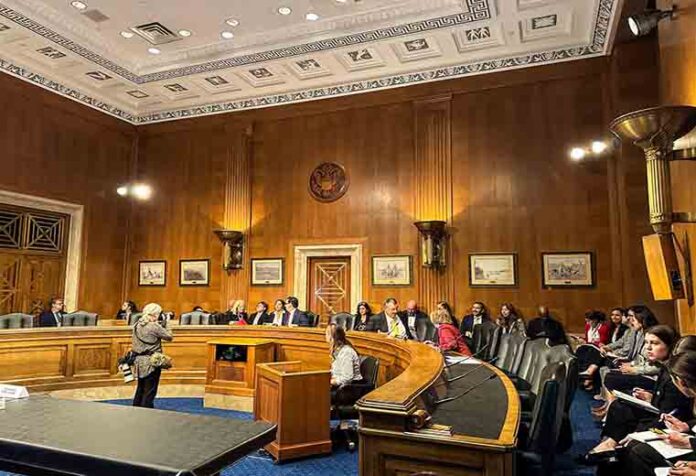The Senate Armed Services Committee is gearing up for a pivotal session as it approaches the confirmation hearing for Peter Hegseth, nominated to take the reins as the next secretary of Defense. This hearing, set for January 14, comes at a time when national security challenges are particularly pressing, placing significant scrutiny on Hegseth’s credentials and vision for the military’s future.Lawmakers are expected to probe deeply into his policy stances, past military experience, and views on global threats, especially regarding China, Russia, and cybersecurity issues.
Several key topics are anticipated to dominate the discussion during the confirmation hearing:
- Military Readiness: Questions regarding strategies to address the readiness gap across the armed forces.
- Veteran Affairs: An examination of Hegseth’s plans to improve care and support for veterans, a critical issue for many senators.
- Budget Management: How he intends to navigate budget constraints while ensuring military effectiveness.
- International Relations: Insights on collaborative military strategies with NATO allies and other global partners.
Key Issues and Challenges Facing Hegseth During the Confirmation Process
As the Senate prepares for the confirmation hearing of Pete Hegseth as the Defense Secretary, several crucial issues and challenges loom on the horizon. First and foremost, Hegseth’s past controversial remarks and affiliations may attract significant scrutiny from both Democratic and autonomous senators. Concerns over his previous statements regarding military policies and veterans’ issues coudl lead to intense questioning, making these topics central to the discussions. Moreover, various advocacy groups have vowed to voice their dissent, possibly rallying public opinion against his confirmation:
- Accusations regarding divisive rhetoric.
- Past comments on veteran affairs that may not align with current bipartisan views.
- Potential conflicts of interest considering his previous roles in media and advocacy.
Another obstacle Hegseth may face is the geopolitical climate, which requires an immediate focus on national security threats and defense preparedness. Senators from both sides of the aisle may delve into his stance on critical issues such as the ongoing tensions with China and Russia, alongside the evolving threats posed by terrorism. Hegseth will need to present a complete strategy that not only addresses these concerns effectively but also resonates with the diverse opinions of the Senate. Ultimately, navigating these complex issues will be paramount as he seeks to gain the necessary support for his confirmation:
- Clarification of his military strategies in relation to existing global threats.
- Demonstrating unity and collaboration within the defense community.
- Ensuring preparedness for rapid technological advancements in warfare.
 Implications of Hegseth’s Leadership on National Defense policy
Implications of Hegseth’s Leadership on National Defense policy
The confirmation of Pete Hegseth as the next defense Secretary could mark a significant shift in the United States’ approach to national defense. Hegseth, known for his strong advocacy of military readiness and aggressive posturing towards global threats, is likely to push for policies that emphasize a more robust defense budget and preparedness. Under his leadership, the Pentagon may prioritize the following key areas:
- Increased Military Spending: A push for expanded resources towards modernization of military equipment and technology.
- enhanced Global Presence: Strategic deployments aimed at deterring adversaries and reinforcing alliances, particularly in volatile regions.
- Cybersecurity Investments: Amplifying efforts to defend against cyber threats through innovative technologies and strategic partnerships.
Moreover, his leadership might influence defense policy debates within Congress, fostering scenarios where bipartisan support could either emerge or fray based on differing views of military engagement. The anticipation of Hegseth’s confirmation has already ignited discussions around the U.S.’s role on the world stage and how it balances diplomacy with military action. Factors that could shape this dialog include:
- stance on NATO: Reaffirming commitment to NATO allies while demanding greater defense contributions from member nations.
- Counterterrorism Strategies: Potential repositioning of resources to combat emerging terror threats with a comprehensive approach.
- Relations with China and Russia: A more assertive strategy toward these nations, possibly recalibrating the global balance of power.
 Stakeholder Reactions and Insights Ahead of the January 14 Vote
Stakeholder Reactions and Insights Ahead of the January 14 Vote
Conversely, critics are raising concerns regarding Hegseth’s controversial past statements and positions on military policy. Advocacy groups for civil liberties are particularly alarmed, citing potential impacts on civilian oversight and accountability in military operations. In this tense atmosphere,senators are weighing various perspectives,including:
- Concerns over partisanship in a traditionally non-partisan arena.
- Impact of social media presence on public perception and military morale.
- Potential shifts in defense priorities under Hegseth’s leadership.
As debates intensify, stakeholders and constituents alike remain vigilant, with many expressing the hope that the vote will reflect a commitment to national security while also fostering unity within political ranks.
